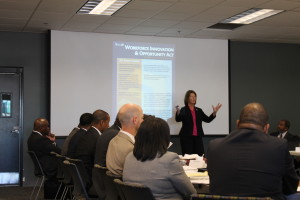Detroit’s revitalization is intimately tied to one all-important aspect of any city’s economic prosperity: job creation. That is where the city’s new Workforce Development Board, even in its infancy, is already showing the potential to boost the number, the quality and the training needed to improve the job outlook within Detroit.
Led by Mayor Mike Duggan, the Workforce Development Board has worked diligently together and in smaller committees since holding its first official meeting last October, officials said. Its March meeting was expected to update its progress on topics like the job gap as well as a citywide survey of groups offering job training.
 The Board – which includes 38 members of all areas of industry, education and labor – will meet quarterly to go over top issues of importance to the Mayor, the city, the region and beyond in terms of job growth, skill development and talent retention, said Jeff Donofrio, the city’s new Director of Workforce Development.
The Board – which includes 38 members of all areas of industry, education and labor – will meet quarterly to go over top issues of importance to the Mayor, the city, the region and beyond in terms of job growth, skill development and talent retention, said Jeff Donofrio, the city’s new Director of Workforce Development.
“We have a dynamic board with a lot of energy who are dedicated to directing that energy toward this effort,” Donofrio said. “We’re addressing the real needs of the population and employers, who want to grow but cannot if they cannot find the right talent.”
The Board will discuss the Mayor’s initiative to hire more students and young adults through the newly launched Grow Detroit’s Young Talent program. In just 5 weeks, more than 11,000 Detroiters between the ages of 14 and 24 went online and applied to participate. The program, recently named one of the fastest growing in the country, offers young Detroiters an opportunity to spend their summer working at a variety of Detroit businesses, community-based organizations and nonprofits.
One of the biggest topics the Board will study in these early months is how to understand and then unite the 300-plus workforce providers in and around Detroit, Donofrio said. These groups vary from Goodwill to Focus:Hope to The Greening of Detroit. By studying the survey, talking with these groups and coordinating their efforts with those of the city, Detroit can “connect the dots” for job growth, Donofrio said.
Another significant issue is how the Board works with city residents and job seekers, Donofrio noted. The ultimate goal is to find solutions for people in a wide array of situations, particularly those who tend to be ignored or overlooked such as people who were formerly in jail, had substance abuse problems or related barriers to employment.
“We need to find clear pathways to jobs,” said Donofrio, who noted that these boards have a storied after first starting in the 1970s in Boston. Sen. Ted Kennedy wrote boards into federal law; every municipality that receives federal dollars must have one.
Detroit’s Workforce Development Board has an extraordinary opportunity to create real, long-lasting change, Donofrio said. Its membership includes not only heavy hitters from automotive (Ford Motor Co., General Motors Corp. and Fiat Chrysler), it has representatives from real estate, healthcare, manufacturing and more. Employers of all sizes also are included.
“The goal is to have companies who understand the community’s needs and have ideas, resources and opportunities to align the workforce to meet them,” Donofrio said.
Plus, all of those CEOs who agreed to participate said they also would put resources of all kind, particularly financial, behind this effort, Donofrio noted. “Not many cities have the kind of high-powered muscle that we have on this board,” he added.


